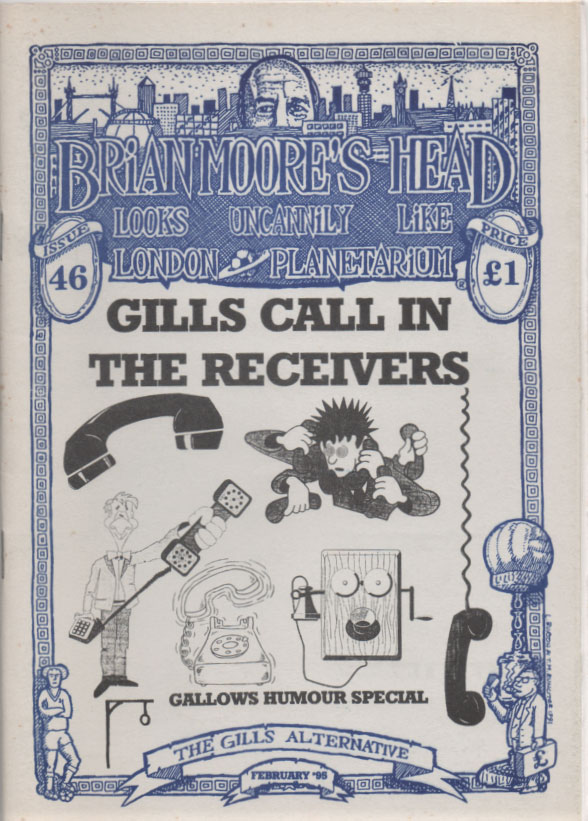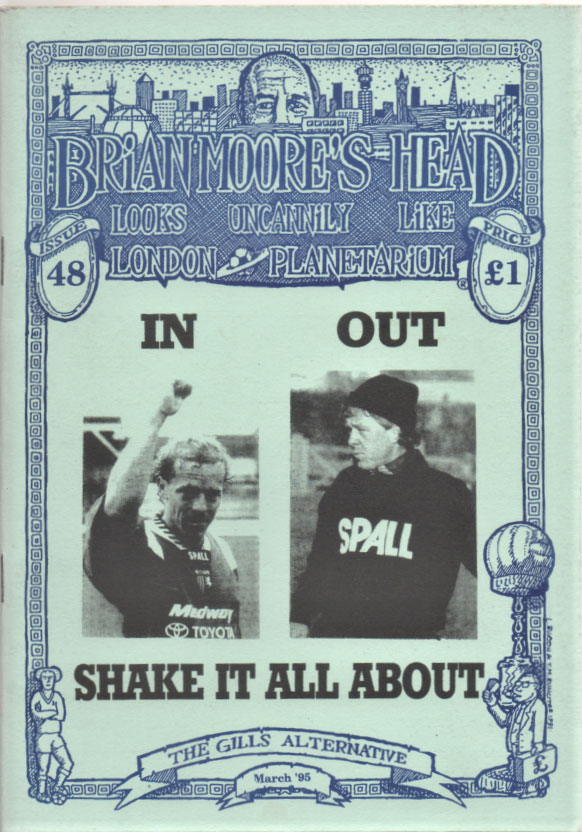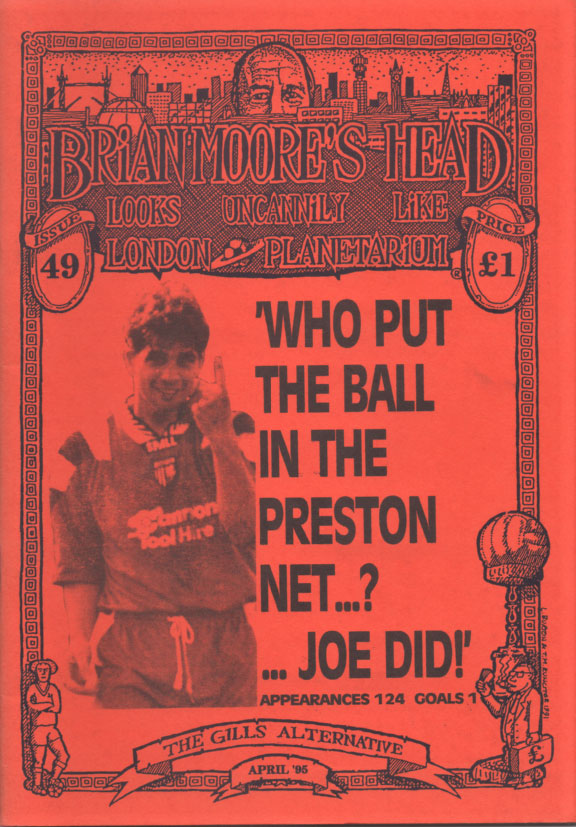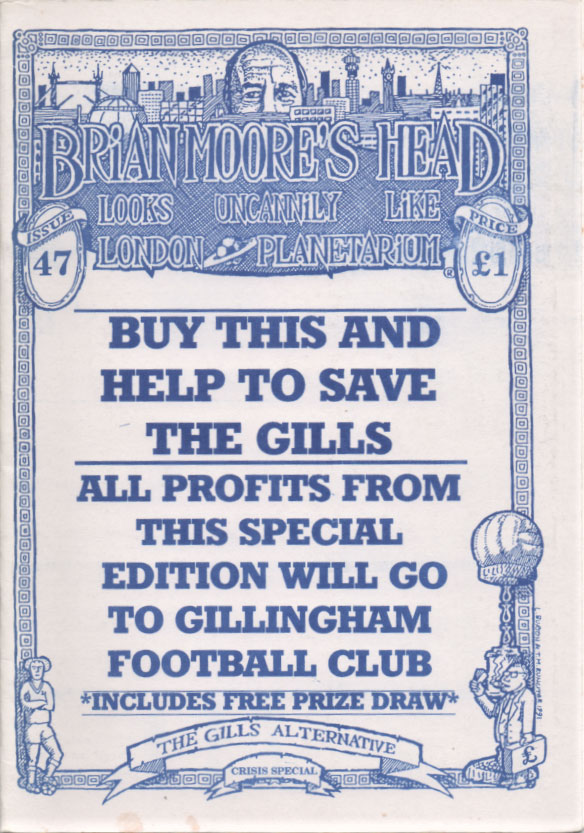Andy Ford concludes his fanzine series.
Issue forty-six of Brian Moore’s Head Looks Uncannily Like London Planetarium went on sale for the first time before the home game against Lincoln City on Saturday 4 February 1995. Four weeks earlier, a crowd of 10,425 had packed Priestfield for an FA Cup third round match against Premiership Sheffield Wednesday, which the visitors won 2-1.
The editorial of BMH46 included the following, ‘Less than two hours after the final whistle of the Wednesday tie, the whole future of Gillingham Football Club was thrown into jeopardy when [director] Tony Smith called in the receivers. Although Gills have received many enquiries, as a result of the advertisement placed in the Financial Times, from parties interested in putting up the money to safeguard our future, it is still possible that there may not be a Gillingham Football Club next year.
At least Tony Smith’s actions in bringing in the receivers brought matters to a head. You can’t blame Tony Smith. Without him, we wouldn’t have a club now. It was over three months ago that Tony declared he was selling up. Instantly, [chairman] Bernard Baker declared himself as the saviour. He was going to safeguard our future. But he never came up with the money. In the end, Tony Smith had no other real option than to put Gillingham into the hands of the receivers.

As I write, two and a half weeks into receivership, lots of people have had something to say about our predicament. There has been one person from whom the silence has been deafening – Bernard Baker. We will surely have to look elsewhere for our saviour – for one thing, a lot of the supporters have lost faith in Baker.’
BMH’s ‘Doomsday Diary’, covering the Gills on a day-to-day basis from the start of receivership, detailed the public meeting held in the Main Stand at Priestfield on the evening of Thursday 19 January. Well over five hundred attended, with Tony Smith and administrator Tom Burton setting out the club’s position before answering questions.
Bernard Baker was not present. £1,000 was raised on the night through a raffle and collection and one supporter handed over £50 to pay for the cost of the floodlights being used. The diary also mentioned the Gills Supporters’ Club donation of £2,500 towards restocking the club shop and their offer to pay for the wages of loan player Mick Bodley if he remained at Priestfield for a further month.
BMH reported that, rather cheekily, Brentford manager David Webb had offered £20,000 to buy out the 30% cut on future transfers that had been part of the deal when Nicky Forster joined the Bees from Gillingham. When Forster left Brentford to join Birmingham in January 1997, the fee was £700,000, with 30% equating to £210,000. The Head also joined in on the fund-raising, with the announcement of an additional issue of between 20-30 pages, instead of the normal 50+ pages, but still selling for £1, with all profits to go to the club, ‘You may well ask “Why don’t you just donate the profits from an ordinary issue?” – we could, of course, do this, but this would only raise about £100 and we think we can do a lot better than that.’
Former Gillingham striker Paul Baker had written to the fanzine and his letter, in response to a tribute piece on him that had appeared in issue 44, was printed in BMH46. Baker had joined in January 1993 from Motherwell but struggled to settle initially in Kent.

He was soon incurring the wrath of the Gills fans, with the article in BMH44, ‘Baker Days’, recalling that ‘the situation came to a head after a 3-1 defeat at Hereford towards the end of March, when the supporters turned on Baker and he foolishly came over to confront his baiters. There was a perimeter fence between player and fans. Otherwise, it could have got nasty. Baker was eventually led away.
Ironically, it was a turning point. Baker began to settle and his performances improved.’ The striker scored the second goal in the vital last home match of that season, against Halifax Town, his effort putting us 2-0 up and easing the nerves felt when we’d held a precarious one goal advantage, the eventual 2-0 victory guaranteeing safety from relegation to the Conference, with a week of the season remaining.
Baker’s letter included, ‘The article made me feel quite chuffed to think that anyone had gone to the trouble to write anything, let alone something that was, in my eyes, a very accurate account of my brief up and down spell at Gillingham FC. As regards that Halifax goal, it was a very important goal, I agree. I have that very match ball, the reason being that it was the 100th goal of my career – well I thought it was my 100th, but, after some calculations, I found I’d had a goal scratched off when I played for Hartlepool, so it was only my 99th, a goal I cannot forget.
The only real thing I want to forget about my time at Gills was that stupid encounter I had at Hereford. I really don’t know what I was doing, but I do know it was very unprofessional indeed. To say I had a few drinks in the Social when we returned would be an understatement. It would be fair to say we hadn’t really settled in Kent, but I’m not the first, and I won’t be the last, as I know this happens in all walks of life. You have to understand it is a very big step to take; moving 300 miles from your hometown is bound to have its complications, especially where children are concerned; moving schools, leaving family and friends so far away, believe me, it’s very hard.
Anyway, I feel as if I owe you an explanation as I don’t want people to think I left on a bad note. If and when I do return to Priestfield I will, I’m sure, enjoy whatever reception you have in store for me. I wish you every success for the future.’ BMH commented that ‘in the seven years we have been producing this fanzine, Bakes is only the second player to write to us (Danny Westwood was the other, trivia fans), which, I believe, says much about his character. One thing is for sure, when all other memories of him have faded, Paul Baker will long be remembered for that goal.’
The fund-raising edition of Brian Moore’s Head was available for the first time at the match against Walsall at Priestfield on Saturday 4 March. At twenty-four pages, it was less than half the normal size, so we were able to carry twice as many copies as usual to sell at the game.
Despite the vast increase in the number available, we sold out before kick–off. The thinner edition meant a bigger profit as we were selling for the usual price, whilst Sportspages bookshop and printers Juma also helped out, the former stocking the issue on a non-commission basis, the latter providing a 35% discount on the printing bill.
BMH included a free draw, with prizes including two tickets to see ‘Fever Pitch’ at the Arts Theatre, London, subscriptions to the Head, ‘to be declared null and void if we haven’t got a club to write about’ and the official match video from the previous season’s historic victory at Carlisle. Included in the editorial was, ‘As we go to press, the future of the club is still uncertain, although negotiations with several prospective buyers have apparently gone into a second stage. All involved are purported to be “serious football people” and, from what I have heard, we can rule out the possibility of our club being owned by Rod Stewart, Bernard Baker or, indeed, the Crewe burger woman.
We can only wait and hope that a saviour will emerge but, in the meantime, I urge all supporters of this club to do anything you can to help. It doesn’t matter how big or small the gesture, whether it entails sending a cash donation, encouraging a friend or relative to come or any other action that in some way helps the club – do it! Don’t let this club die through apathy on your part.’
The article ‘How many?!’ started, ‘The news that the club had finally launched a crackdown on complimentary tickets did not come as too much of a surprise as it’s a subject that has been causing friction for some little time. However, the sheer scale of the problem, as revealed in the 17 February edition of Kent Today, certainly shocked me and, I suspect, the majority of supporters.
I mean, 300 tickets for God’s sake, how on earth did the club manage to get themselves into a situation where so many freebies were being handed out.’ The writer pointed out that he had a complimentary ticket, but it was payment for writing a regular column in the programme ‘and not merely doled out ‘cos I knew someone who was a friend of a player’s Dad (or whatever).’

However, the club then addressed the complimentary issue in a poor manner, declaring all comps null and void, twenty-four hours prior to the home game against Northampton. Gillingham wanted to call in all tickets and start from scratch, which was fair enough, ‘but there are people who have done a lot of work for this club over the years, e.g. Andy Bradley, who you may recall was given free entry to Priestfield “for life” over a decade back, for completing a quarter of a century in the field of programme editing / contributing.
Surely no-one could seriously argue that Bradders is not worthy of receiving a comp, but this did not stop him getting a phone call informing him that his season ticket was no longer valid, the evening before the Cobblers game. All programme contributors got the same treatment and we were all tarred with the same ‘freeloaders’ brush, something to which I strongly object.
Programme contributors receive no other payment but a season ticket for the work they put in (which adds up to an awful lot of hours during the course of a season. Perhaps you’ll still say, “The programme’s crap and you don’t deserve paying”, in which case I suggest you ring the club and offer your services for free. That said, you simply can’t argue with the comps crackdown, and I’m not, I’m just saying it should have been handled better. Perhaps as a new list of comps is built up it would be a good idea to record precisely what each person does to merit getting a ticket. In this way, we can avoid allowing the same sorry situation to occur again.’
Three weeks after the fund-raising issue, BMH was back with number forty-eight, with the following disclaimer appearing on page two, ‘We would like to categorically deny the rumour that 300 complimentary copies of each issue are being given out. No professionally run outfit would ever be stupid enough to hand out that many freebies.’ The cover reflected the managerial change that had taken place, with Mike Flanagan having been made redundant by the receivers and replaced by Neil Smillie, who appointed Gary Micklewhite as his assistant.
The article ‘Here comes the rain again’ covered the home fixture against one of our Essex rivals, ‘Would you believe it?! Six weeks after the Colchester game was postponed a whole thirty minutes before kick-off, the re-arranged game went the same way. This time, though, we had nearly twice the amount of prior warning before the ref paddled through the shallow regions of the Priestfield pitch, noticing that one of the corner flags had disappeared below the shimmering surface, and called it off once more.’
The Head wondered what the programme would be like when the match was finally played. The original edition had been customised for the second attempt to get the game on, with four pages removed, which included an interview with commercial manager Bill Williams that would have been embarrassing for two reasons; it had subsequently been reproduced in the Lincoln programme and Williams had since been made redundant, ‘these pages were replaced by a wraparound extra thingy – only the wraparound wasn’t wrapped around but stapled into the middle’. In addition, it contained Mike Flanagan’s column and he had also lost his job, as had programme editor Roger Evans, who had also penned an article, ‘so, assuming that the same programme is utilised again, what will they do with it? The sensible option would be to ditch Flanagan’s piece as well and to also chuck the wraparound. However, the most stylish thing to do would be leave it as it is and add a second wraparound, but actually wrap it around the outside where it should be. This could become a real collectors’ item, like the proggie from our twice-postponed game at Derby in 1986, which was originally scheduled for 5 February, then for 26 March, and finally for 7 April. The end result is a programme with a wraparound which has been wrapped around the original wraparound, which has itself been wrapped around the actual programme. Or perhaps it would just be easier to start from scratch.’ As it turned out, the Supporters’ Club funded the production of a totally new programme when the fixture eventually took place.
Amongst the various parties interested in buying Gillingham Football Club was a showbiz consortium led by Ross Hemsworth. The article ‘House of Cards’ in BMH49 stated that his ‘all-singing all-dancing takeover bid collapsed within a couple of weeks of it first appearing, in a blaze (or, at least, a 60-watt bulb) of publicity. Apparently, the people to save the club were Freddie Starr, Mick Jagger and “that bloke out of London’s Burning” and the project was all going to be fronted by, according to Hemsworth, “one of the biggest managers of the game”.’
This was Malcolm Allison, whose five months in charge at Bristol Rovers in 1993-94 turned out to be his last managerial role in the UK. When Allison appeared on Meridian to be interviewed about the prospective takeover, ‘he appeared confused and lacking knowledge on the subject. About all he could say was, “This bloke rang me up and said do you want to run Gillingham FC and I said alright then”.’
Hemsworth and co were talking big, ‘plans for a Kent super stadium were afoot, there was £10M to spend, we were going to witness pop concerts and big fights. They were going to put the glitz and glamour back into Gillingham.’ Ross ‘calmly announced plans for Nigel Benn to fight at Priestfield, “Nigel Benn is keen to fight in Gillingham”, he said. What an utterly surreal spectacle this would have been. The Dark Destroyer strutting his stuff in front of the Rainham End, ringside seats costing several hundred pounds and residents of Gordon Road watching the whole thing for free out of their bedroom windows.’
As the days went by it appeared that it was ‘more of a smokescreen consortium. Freddie Starr denied any knowledge of the deal and it turned out that the only connection with Mick Jagger was that Hemsworth had sent his manager a fax.’ On the same day that the consortium’s accountants contacted the club to say that they were studying the information pack, ‘Hemsworth tabled a £1.75M bid. The deal involved the club being bought outright, but certain creditors (i.e. Tony and Val Smith) not being paid off. “The Smiths seem to be a stumbling block”, commented Hemsworth. And then it was all over.
On Monday 3 April it was revealed that Hemsworth was unemployed and had a catalogue of failed business ventures behind him. He resigned from the consortium.’ The Headitorial in the same issue commented, ‘The showbiz consortium quickly crumpled under the weight of its own hype. I don’t think there is anyone reading this who will be too upset about it, as surely no-one was taken in by something that was so obviously a non-starter from day one. The Hemsworth consortium merely provided a bit of light relief, and maybe we shouldn’t be too hard on poor old Ross who, at the end, was revealed as rather a sad man suffering from delusions of grandeur.’
The piece ‘What we raised and what we did’ stated that the fundraising issue was all but a complete sell-out and raised £600, ‘instead of passing this directly to the club, we handed it to the Supporters’ Club who, as you are probably aware, have been doing sterling work in raising funds for the club. We wanted a specific project for the cash and so it was decided that the six hundred notes would go towards the cost of the team’s overnight stay at Carlisle. Much good it did us of course, as we still lost! But many thanks to everyone who bought a copy.’
At the end of each season I considered whether I wanted to continue working on the fanzine for the following campaign. Initially, it had been an easy decision to make, but the end of 1993-94 had been the first when I’d had a few doubts. When the 1994-95 campaign came to a conclusion, at a time when we didn’t know if Gillingham FC would still exist come the following August (and no Football Club meant no fanzine) I decided to step down from BMH. My time on the publication, dating back to its first year and including several seasons as co-editor, had been mainly very enjoyable but time consuming. Although the increase in the number of issues over the previous two years had made sound financial sense, I hadn’t been keen on the change as there always seemed to be a deadline looming and increasing pressure to come up with content to fill blank pages. At the end of 1994-95 I felt that it was the right time to leave and I have never regretted my decision.
